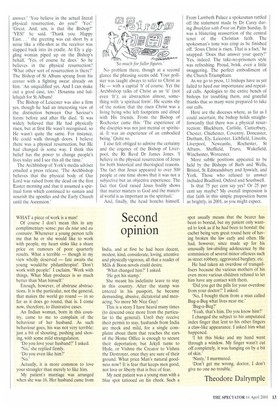Second opinion
WHAT a piece of work is a man!
Of course I don't mean this in any complimentary sense: pas du tout and au contraire. Whenever a young person tells me that he or she would like to work with people, my heart sinks like a share price on rumours of poor quarterly results. What a terrible — though in my view wholly deserved — fate awaits the young would-be philanthropist! 'Don't work with people!' I exclaim. 'Work with things. What Man produces is so much better than Man himself.'
Enough, however, of abstruse abstractions. It is the particular, not the general, that makes the world go round — in so far as it does go round, that is. I come now, therefore, to illustrative cases.
An Indian woman, born in this country, came to me to complain of the behaviour of her husband. As such behaviour goes, his was not very terrible: just a bit of shouting, pushing and shoving, with some mild strangulation.
`Do you love your husband?' I asked. 'No,' she replied firmly.
'Do you even like him?'
`No.'
Actually, it is more common to love your strangler than merely to like him.
My patient's marriage was arranged when she was 16. Her husband came from India, and at first he had been decent, modest, kind, considerate, loving, attentive and physically vigorous, all that a reader of Mills & Boon novels could desire.
'What changed him?' I asked, `He got his stamp.'
She meant his indefinite leave to stay in this country. After the stamp was entered in his passport, he became demanding, abusive, dictatorial and menacing. No more Mr Nice Guy!
This is a story I have heard many times (to descend once more from the particular to the general). Until they receive their permit to stay, husbands from India are meek and mild, for a single complaint about them that reaches the ears of the Home Office is enough to secure their deportation; but Jekyll turns to Hyde, or Vishnu the Creator to Vishnu the Destroyer, once they are sure of their ground. What price Man's natural goodness now? It is fear that keeps men good, not love or liberty that is free of fear.
My next patient was a young man with a blue spot tattooed on his cheek. Such a spot usually means that the bearer has been to borstal, but my patient only wanted to look as if he had been to borstal; the cachet being very great round here of having broken the law early and often. He had, however, since made up for his unusually law-abiding adolescence by the commission of several minor offences such as street robbery, aggravated burglary, etc.
He had taken an overdose of tranquillisers because the various mothers of his even more various children refused to let him have any contact with them.
`Did you get the pills for your overdose from your doctor?' I asked.
`No, I bought them from a man called Bug-a-Bug what lives near me.'
'Bug-a-Bug?'
'Yeah, that's him. Do you know him?'
I changed the subject to his amputated index finger that lent to his other fingers a claw-like appearance. 1 asked him what happened.
'I hit this bloke and my hand went through a window. My finger wasn't cut off completely, it was hanging on by a bit of skin.'
'Nasty,' I murmured.
`Don't get me wrong, doctor, I don't give no one no trouble.'
Theodore Dalrymple


























































 Previous page
Previous page